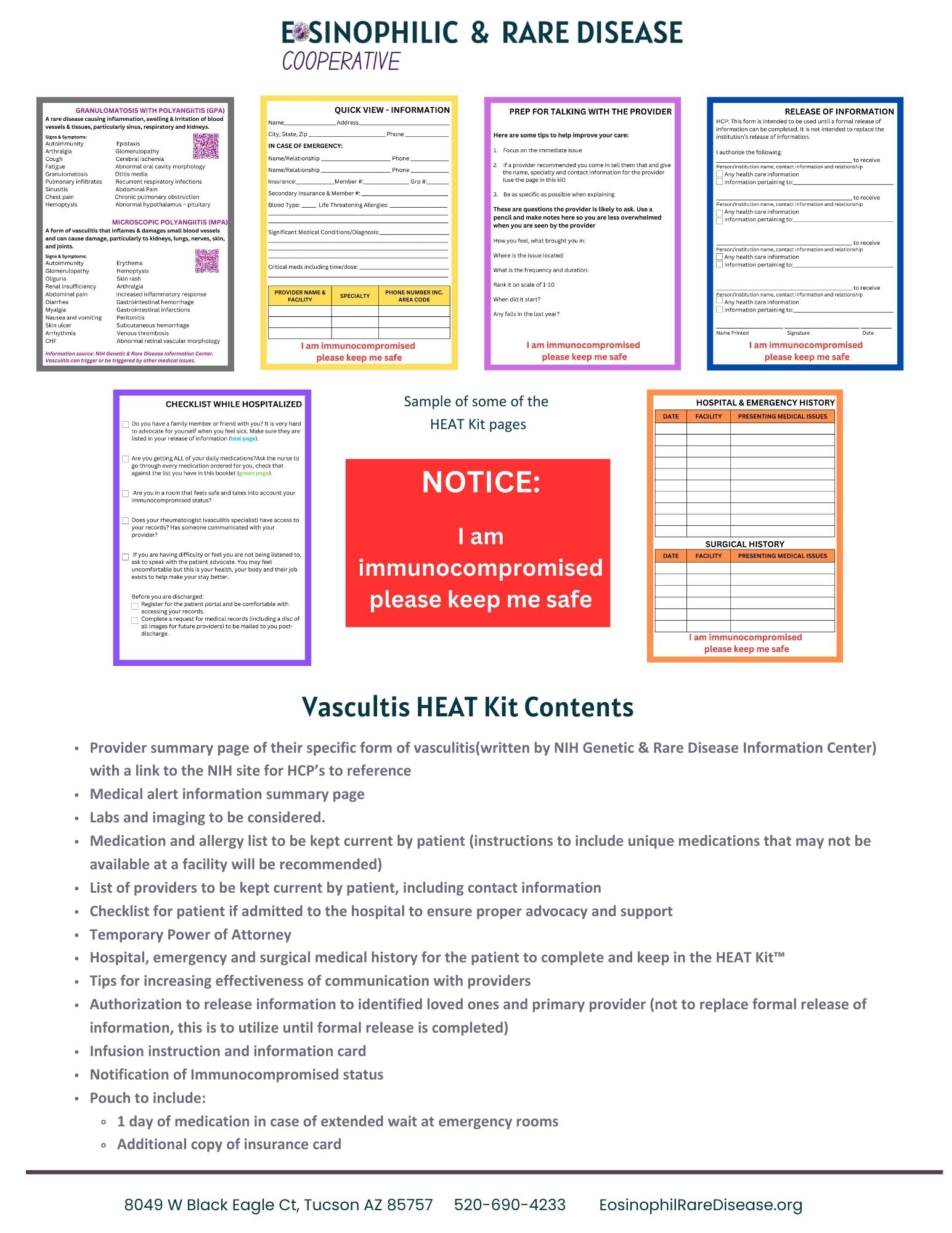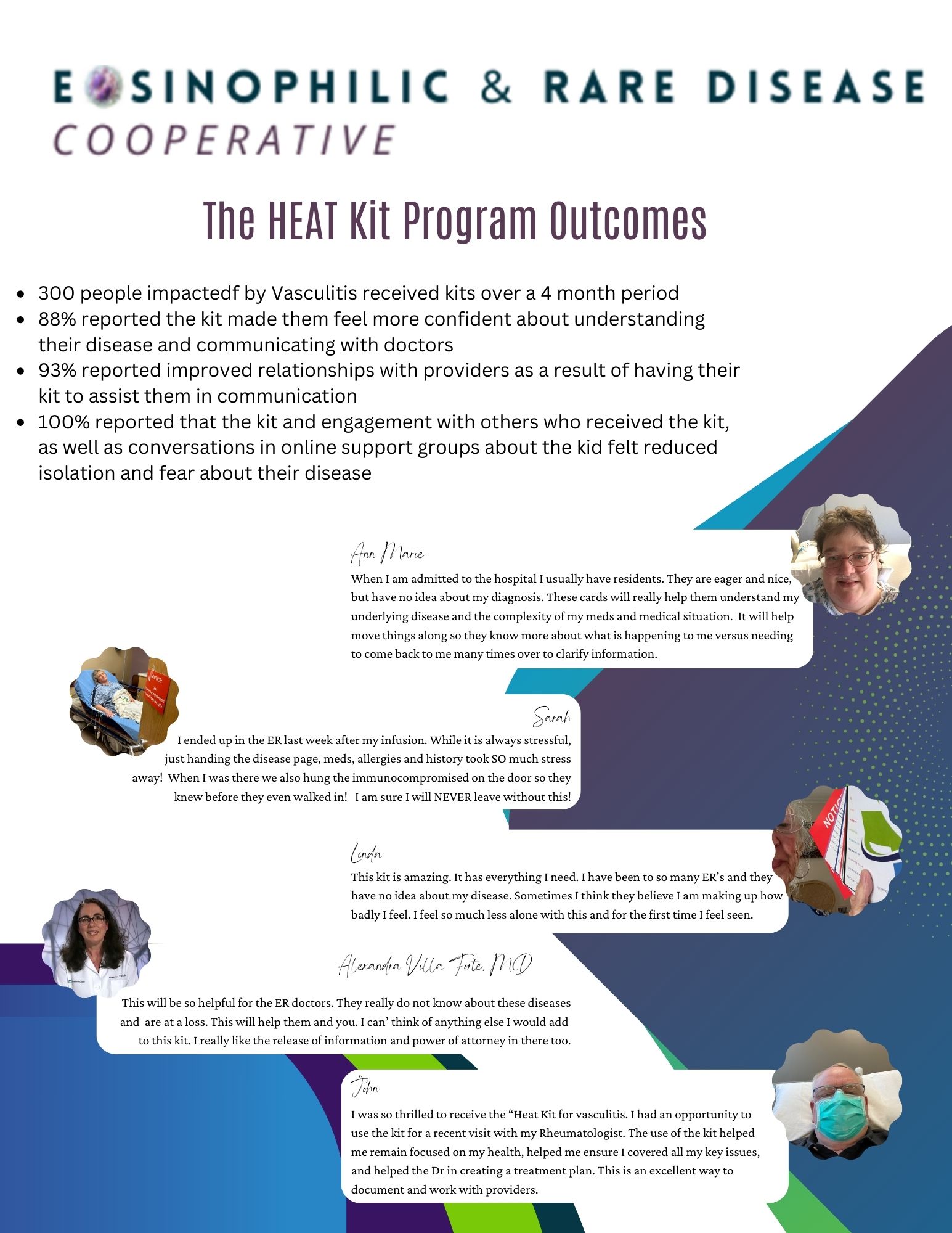Session Information
Date: Monday, November 18, 2024
Title: Vasculitis – Non-ANCA-Associated & Related Disorders Poster III
Session Type: Poster Session C
Session Time: 10:30AM-12:30PM
Background/Purpose: All forms of vasculitis are rare with patients frequently experiencing poor or extended care in the hospital and ED settings. The ERDC founder experienced this first hand when being evaluated for what was eventually diagnosed as EGPA. The experience led them to develop a durable and convenient hospital and emergency kit that met reported experiential pain points and enables people with vasculitis to educate providers and improve quality of care at hospital and other health care appointments. The purpose of this study was to explore a broader sample of the vasculitis community’s experiences in health care settings to further inform the HEAT Kit development and dissemination.
Methods: Ethnographic interviews for individuals who wanted to supplement their survey data. Survey administered to patients and care partners of people with vasculitis. Questions included: basic demographic and disease state information; pain points when presenting at a hospital; types of pain points; frequency of pain points with vasculitis specialist; other disease specialists and PCPs; frequency of hospitalizations, and percent of time alone when in the hospital or ED.
Results: An anonymous 15 question survey was sent to 256 people with vasculitis. 106 patients completed the survey – 31% GPA, 24% MPA, 24% EGPA, 21% other vasculitis. (Top pain points related to wishing the patient had remembered to tell the provider about a symptom or part of history, a lack of understanding about vasculitis and symptoms being discounted. Patients reported they experience these pain points 61% of the time in the ED, 50% with other specialists, 42% of the time with PCPs and 31% of the time with their vasculitis specialist. 73% of respondents have between three to six providers they see frequently, 20% have seven or more they see regularly. Forty-seven percent have been hospitalized between 1-4 times in the last 12 months. Thirty-seven percent of the respondents report they were alone in the hospital or ED at least 50% of the time, and 16% were always alone.
Conclusion: Survey results supported the need for further development of disease-specific HEAT kits based on the hospital and ED experiences of patients with vasculitis. Subsequently, ERDC created and tested a HEAT Kit over the course of 2 years. These kits have been distributed to more than 500 people impacted by vasculitis in 43 states and 13 countries. Feedback from patients indicates improved confidence and increased ease of communicating with providers in high stress settings. Patients also report use of kit for non-emergent appointments with specialists and PCPs.
To cite this abstract in AMA style:
Jones S, Squires P, McArthur D. Development of the Hospital Emergency Advocacy & Treatment Kit (HEAT Kit) for Patients with Vasculitis [abstract]. Arthritis Rheumatol. 2024; 76 (suppl 9). https://acrabstracts.org/abstract/development-of-the-hospital-emergency-advocacy-treatment-kit-heat-kit-for-patients-with-vasculitis/. Accessed .« Back to ACR Convergence 2024
ACR Meeting Abstracts - https://acrabstracts.org/abstract/development-of-the-hospital-emergency-advocacy-treatment-kit-heat-kit-for-patients-with-vasculitis/


